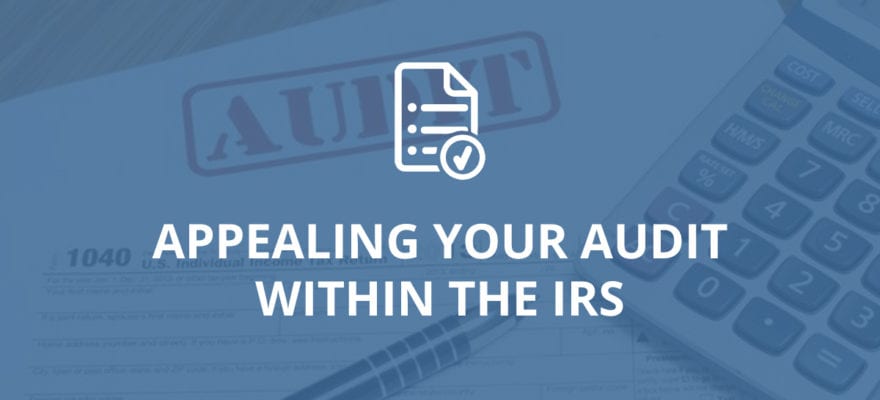You know that the IRS can audit a person or a business for any number of reasons. What you may not be aware of is that you don’t have to accept the government’s conclusions as to the final say on whether or not you owe back taxes.
You can appeal an IRS audit in the same manner that you appeal a lesser court decision. Appealing your case also postpones your tax bill’s due date for the duration of the process, which can last for months. This additional time makes it easier for you to work out a payment plan with the IRS or save the funds necessary to pay the final assessment.
What is the Appeals Process?
When you receive an official IRS decision after an audit, you have up to 30 days to file an appeal. (You can still appeal even after the 30-day deadline, although the process is more difficult.) It is important to note that appeals may only be made because you disagree with the government’s determination and not due to a dispute based on political, religious, moral, or similar grounds.
In addition to your name, contact details, and a statement that you want to appeal the IRS findings, your written dispute must include the following:
- A copy of the IRS letter with the proposed changes
- The tax period(s) or year(s) involved
- The findings that you disagree with
- The reasons for the disagreement and the facts that support these reasons
- Applicable law or laws that support your position
If you owe less than $2,500, you can request an appeal from your auditor. If the tax liability you are appealing is between $2,500 and $25,000, you can submit Form 12203 to file a Small Case Request instead of request a conference. Small Case Requests are available to everyone except:
- Partnerships
- S-Corporations
- Exempt organizations
- Employee plans
If you owe more than $25,000, your only option is to file a Form 12203.
What Happens After You File Your Dispute?
Upon receipt of your dispute, an IRS Appeals Officer is assigned to your case. The Office of Appeals mainly consists of former auditors with accounting or legal experience who now occupy senior positions with the IRS. They provide taxpayers with an impartial platform to plead their cases and usually try to avoid litigation by finding solutions that encourage voluntary compliance with your tax obligation.
You usually have 60 days to prepare for the hearing, where you will be given the opportunity to present your case, complete with documentation, statements, receipts, and other financial information. The Appeals Officer will review all evidence and listen to any legal arguments before making a final determination.
Most disputes with the IRS are settled at the appeals stage. If you succeed at reaching a settlement, the IRS will provide you with a Form 870- Consent to Proposed Tax Adjustment. If you sign it, you are effectively consenting to the settlement and cannot challenge it in the future. If the conference fails to produce an agreement, you can petition the U.S. Tax Court within 90 days of receiving a Notice of Deficiency, also known as a 90-day letter.
Although appealing an IRS audit can substantially reduce previously assessed taxes and penalties, a comparatively low number of taxpayers appeal their audit results. While some of them just want to get it over with, others feel that they have no chance against the IRS and its resources. It’s an imbalance that you can eliminate by engaging a tax audit attorney.
Contact a New Jersey IRS Audit Appeal Attorney
Even if you have been dealing with the IRS up to the point that it concludes its audit, it is strongly recommended that you engage an experienced NJ tax lawyer before pursuing an appeal. Your attorney can attend the hearing on your behalf present your position in a clear and convincing manner, using documentary evidence as well as legal analysis and authority.
At Paladini Law, Attorney Brad Paladini has successfully represented many clients at IRS audit appeal hearings and will use his expertise in federal tax law to ensure a fair outcome to your case. For more information or to schedule a confidential consultation, please contact us or call 201-381-4472.



